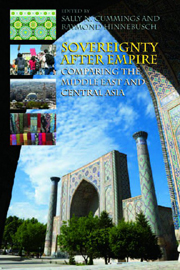Book contents
- Frontmatter
- Contents
- Acknowledgments
- Notes on the Contributors
- 1 Introduction
- SECTION I Histories of Empire and After
- SECTION II Paths to Sovereignty: Views from the Core and Periphery
- SECTION III Empire and Domestic Sovereignty
- SECTION IV Empire and Popular Sovereignty
- SECTION V Empire and External Sovereignty
- 13 Empire and State formation: Contrary Tangents in Jordan and Syria
- 14 Rentierism, Dependency and Sovereignty in Central Asia
- 15 Tajikistan: From de facto Colony to Sovereign Dependency
- 16 Conclusions
- Bibliography
- Index
13 - Empire and State formation: Contrary Tangents in Jordan and Syria
from SECTION V - Empire and External Sovereignty
Published online by Cambridge University Press: 12 September 2012
- Frontmatter
- Contents
- Acknowledgments
- Notes on the Contributors
- 1 Introduction
- SECTION I Histories of Empire and After
- SECTION II Paths to Sovereignty: Views from the Core and Periphery
- SECTION III Empire and Domestic Sovereignty
- SECTION IV Empire and Popular Sovereignty
- SECTION V Empire and External Sovereignty
- 13 Empire and State formation: Contrary Tangents in Jordan and Syria
- 14 Rentierism, Dependency and Sovereignty in Central Asia
- 15 Tajikistan: From de facto Colony to Sovereign Dependency
- 16 Conclusions
- Bibliography
- Index
Summary
Empire matters for post-imperial sovereignty and variations in imperial impact make for variations in post-colonial states. Indeed, the initial differential impacts of imperial experiences have put Middle East states on divergent pathways that have endured for decades after independence. This chapter will compare the cases of Syria and Jordan, showing how the era of Western empires set them on enduring differential tangents that resulted in quite divergent regimes and contrary foreign policy orientations that persist to this day.
The analysis is in the tradition of historical sociology which assumes that each individual state's formation reflects some quite specific combination of local and external (international) agency; hence, there is a constant interaction as the external shapes the internal and the internal responds to the external. In this case, the decisive interaction is between, first, imperialism and local actors, resisting or collaborating; and, second, in the post-colonial period between the regional states system (protected or dominated by Western great powers) and differently constituted regimes in Jordan and Syria. State-building was in both cases intimately shaped by the post-First World War Versailles settlement, but responses to it differed, varying between rejection and acceptance. This depended on such factors as: (1) whether identity was satisfied or frustrated by boundaries imposed under imperialism; and (2) whether a regime originated in external imposition/ protection by imperialism or revolution against imperialism and its residues.
- Type
- Chapter
- Information
- Sovereignty after EmpireComparing the Middle East and Central Asia, pp. 263 - 281Publisher: Edinburgh University PressPrint publication year: 2011



